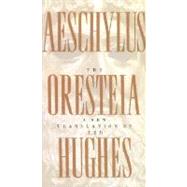The Oresteia of Aeschylus A New Translation by Ted Hughes
, by Hughes, Ted- ISBN: 9780374527051 | 0374527059
- Cover: Paperback
- Copyright: 9/4/2000
In the last year of his life, Ted Hughes completed translations of three major dramatic works: Racine'sPhedre, Euripedes'Alcestis, and the trilogy of plays known as atTheOresteia, a family story of astonishing power and the background or inspiration for much subsequent drama, fiction, and poetry. The Oresteia--Agamemnon, Choephori, and the Eumenides--tell the story of the house of Atreus: After King Agamemnon is murdered by his wife, Clytemnestra, their son, Orestes, is commanded by Apollo to avenge the crime by killing his mother, and he returns from exile to do so, bringing on himself the wrath of the Furies and the judgment of the court of Athens. Hughes's "acting version" of the trilogy is faithful to its nature as a dramatic work, and his translation is itself a great performance; while artfully inflected with the contemporary, it has a classical beauty and authority. Hughes'sOresteiais quickly becoming the standard edition for English-language readers and for the stage, too. The British poet, translator, author, and criticTed Hughes, born in 1930, wrote more than forty books, including, in the last decade of his life,Shakespeare and the Goddess of Complete Being;Tales from Ovid; verse adaptations of Aeschylus'sOresteia, Racine'sPhegrave;dre, and Euripedes'Alcestis; and the bestsellingBirthday Letters. Hughes served as Poet Laureate to Queen Elizabeth II from 1984 until his death in 1998. In the last year of his life, celebrated poet, critic, and translator Ted Hughes completed translations of three major dramatic works: Racine's Phedre, Euripedes'Alcestis, and the trilogy of plays known asTheOresteia. The OresteiaAgamemnon, Choephori, andThe Eumenidesdepicts the downfall of the house of Atreus: after King Agamemnon is murdered by his wife, Clytemnestra, their son, Orestes, is commanded by Apollo to avenge the crime by killing his mother, and he he does so, bringing on himself the wrath of the Furies and the judgment of the court of Athens. Commissioned by the Royal National Theater, Hughes's "acting version" of the trilogy is itself a great performance, capturing the classical grace and authority of Greek drama at its greatest while also exhibiting an artful and contemporary agility. ThisOresteiais quickly becoming the standard edition for English-language students, scholars, and other readers. "Hughes's rendering of this appalling story has the hurtling momentum one assumes the playwright's original Greek had for his Athenian audience . . . To release the play's staggering power Hughes has transformed some thoughtful scholarly commentary into raw horror and agonizing ethical dilemma . . . Ferociously physical . . . like the best of Hughes's own poems"Ron Smith,Richmond Times-Dispatch "Hughes's rendering of this appalling story has the hurtling momentum one assumes the playwright's original Greek had for his Athenian audience . . . To release the play's staggering power Hughes has transformed some thoughtful scholarly commentary into raw horror and agonizing ethical dilemma . . . Ferociously physical . . . like the best of Hughes's own poems"Ron Smith,Richmond Times-Dispatch "Evinces Hughes's wide range of interests and mastery of classic literatures. His nearly conversational rhythms produce an arresting mixture of colloquialism and formality, enlivened by strong imagery (as in the matricidal Orestes' declaration that 'This house has been the goblet / That the demon of homicide, unquenchable, / Has loved to drain') . . . An essential further installment in the always interesting oeuvre of a gifted poet who was also a diligent scholar."Kirkus Reviews "






